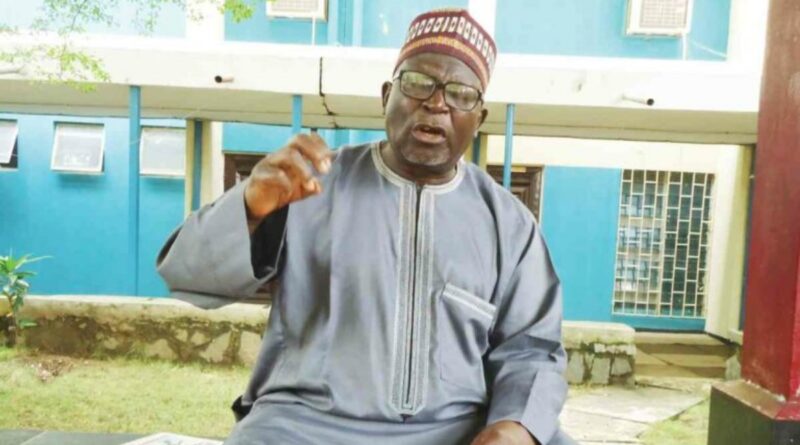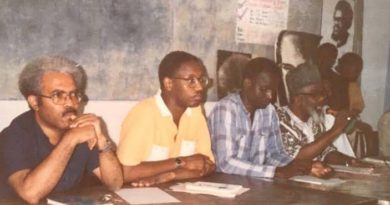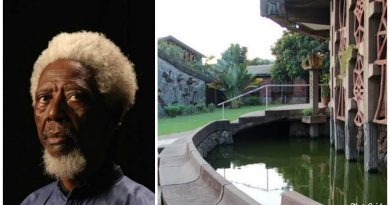Nigeria would have been great if first generation of leaders survived beyond 1966 – Prof. Hamman
Professor Mahmud Hamman is one of the senior professors of History in the Ahmadu Bello University (ABU), Zaria. He has been in the university since 1976 and was a primary school pupil in 1960 when Nigeria got its independence.
In this interview, he shares with Daily Trust the excitement of the merriments that followed the independence, factors hindering Nigeria’s growth, possible way out among other issues.
During independence in 1960, where were you Sir?
I finished primary school the year Nigeria became a Republic in 1963. So, I was in primary school when Nigeria became independent.
Can you recall the mood at independence?
We marked it with parade. The Divisional Officer, who was a white-man, supervised the parade. He was the one that invigilated our Common Entrance.
I can remember very well that his name was Mr. John Haer. All of us; the pupils were well-dressed. We sang the National Anthem, while spectators watched how we matched round the football field and so on and so forth. It was a very memorable event, indeed.
What was the character of leaders like at that time?
The area I came from happened to be one of the remotest areas at that time. I came from Mambilla-Plateau. At that time there were no roads for easy mobility. In fact, the first road reached the Plateau in 1964.
At that time, I was in secondary school. So, most of the people at that time were local. When government officers were posted, they stayed for several years before they were transferred.

Therefore, much of what we heard was from the District Officers (DOs), District Heads et cetera. However, these people were disciplined.
How can you describe the leaders that emerged after independence in terms of commitment to national development?
Well, these were the regional leaders; Sardauna, Awolowo, Azikiwe et cetera. As we all know, right from the colonial period, these leaders were very committed. They fought for independence. So, they suffered for independence and therefore they valued it.
They did not joke with the administration of their regions. They did not joke with the mobilisation of their people and national development at the regional level. Therefore, their legacies are still much there for everyone to see.
If you take the North, the legacies of Sir Ahmadu Bello are still there. Again, if you take the West and East, the legacies of Awolowo and Azikiwe are still there. So, these people fought for the independence, therefore even for the purpose of sustaining their credibility, they were very serious with governance.
Their seriousness paid off. One of the areas they paid attention to was education. You can remember the Universal Basic Education that Awolowo introduced in the West. You can remember the various sensitization campaigns the Sardauna did in the North to make people understand the value of education.
This effort of Sardauna paid off, because in the North we already have another system of education, which is the Islamic education. Therefore, they worked in order to make people accept the Western education. People were made to understand that the Western World benefitted from the Islamic education, especially physical sciences like Mathematics, Astronomy et cetera.
By these efforts, the people of the North were made to accept Western education; some initially resisted it. This challenge was unique for the North, because Islamic education had been established, therefore to introduce another form of education became challenging.
This assisted in human capital development. Many posters with different slogans took over the nook and crannies of the North to sensitise the public on the importance of education.
One of the slogans, I can recall, said “wanda bai iya rubutu da karatu ba, jaki ya fishi,” meaning anyone that cannot read and write, a donkey is better than him.
In terms of economic development, the regional governments did a lot. In the North, agriculture was the mainstay. Marketing Boards, which were inherited from the colonial era, were strengthened. Cotton, groundnut, et cetera, production were strengthened. You remember the groundnut pyramids that we had in those days.
The regional leaders, especially in the North, did not stop at the level of agricultural production, they went ahead to establish Agro-Allied industries like oil mills, cotton ginneries etc.
If you go round Northern Nigeria, you can still find these Agro-Allied industries in remote areas. For instance, in Adamawa, Gombe, et cetera, you find ginneries for processing of cottons and stations for weighing these products.
Textiles were also set up to accommodate the cotton production. There were irrigation schemes. Virtually, agriculture was commercialised, until the advent of the oil boom.
In the West, you have cocoa; in the East you have palm oil; in the Mid-West you have rubber, et cetera. All these were geared towards meeting the basic requirements of the regional governments.
Are you saying that the leaders that emerged after independence got it right in the areas of governance and steering the development of the country?
This is what I am saying. The colonial administrators developed these sectors for their own selfish purposes, but what these leaders inherited, the agricultural, mineral and other sectors, they went ahead to establish industries in order to consume these raw materials.
Similarly, the orientation of exporting these raw materials continued, but they attempted to reorient the economy towards industrialization. In Kaduna, for example, Sir Ahmadu Bello established textile industries in addition to ginneries to process the cotton produced by the local farmers. They also set up infrastructure that they could afford with their earnings.
Ports were maintained for the importation of capital goods to serve the industries and also for exportation of the surplus of raw materials for forex. So, these leaders really appreciated the necessity of economic development and very fast too.
Had these leaders continued, Nigeria could have been one of the most developed in the world. Let me tell you an unsolicited remark made by the Commercial Attaché of Switzerland in 2009 when I was the Director of Arewa House, which is Sardauna’s house that was turned to centre for historical research now under ABU.
The Commercial Attaché came in company of the Ambassador of Switzerland on courtesy call. When they were going out, this man told me that he was not a stranger to Northern Nigeria, saying that he was the site engineer of Kaduna Refinery that he knew Sir Ahmadu Bello.
He said if Sir Ahmadu Bello were alive, the whole of Nigeria, not only North, could have been little England. Yes, there was an eye witness who observed what was happening and made this remark unsolicited.
It was an assessment by a neutral independent personality. Therefore, if these leaders survived beyond 1966, it could have been a different story for Nigeria in terms of development.
People are still talking about the necessity of going back to the regional arrangement; I wouldn’t go for that, because eras come with different formations. Even if these leaders were alive, they could have adopted the present structure.
However, these leaders could have built on their trajectory of economic and general development. The discovery of oil could have accelerated the development, especially human and political developments to suit the present condition.
These leaders you are extolling were blamed for the emergence of ethnicity, regionalism in Nigeria….
Yes, they faced that social problem. However, ethno-religious differences were not much pronounced within the regions.
Ethnic and religious tolerance could have been extended to national level. All these ethno-religious conflicts that started from the 1970s through to 1980s up till now could have been minimised, because they would not support it.
Each of these leaders at their regions focused on the issue of integration. For example, Dr. Nnamdi Azikiwe was reported to have said in a particular forum to Sardauna that let’s forget our differences, but Sardauna reportedly told him no.
He said we needed to understand our differences in order to respect them and find solution to the negative aspects of our differences.
Is Nigeria where it is supposed to be 60 years after independence?
Definitely, the answer is no. There are two things. The military’s incursion into the political affairs of the country is one issue, as they were trained not to govern the civil population.
They were trained to protect the national integrity of the nation. This was the first blow to our quest for national development. When the military came in, the focus of the leaders that emerged after independence on national and economic development was relegated by the military.
They did not make pronouncement that they were stopping economic and national development, but the way they managed the national affairs, the development focus suffered inevitably.
For example, take the issue of power. With our natural resources, Nigeria has no reason not to have sufficient power to run all our affairs. We have a lot of potentials for hydro electricity, coal, solar et cetera.
In those days, coal was only found in Enugu, but now it is found in Gombe, Ajaokuta and many other areas. Now we have gas that can be used as source of power.
Because the military has been there for nearly 30 years without addressing these fundamental infrastructure in modern state, power was hijacked by businessmen who were funded by petro-dollars through importation of generators.
These people sabotaged every effort that was made to make Nigeria self-sufficient in power supply. The second issue is on the other infrastructure. Take the transport sector, for example.
When India inherited the colonial rail network in 1948, they did not joke with it. Today, India has the largest rail network with biggest carrying capacity in the world. Nigeria also inherited similar infrastructure from Britain, but what happened to our railway lines; they collapsed.
Despite the fact that, the railway network was made to serve the purposes of the colonialists, we could have developed it the way India did to suit our interest after independence; to link the entire country.
It would have reduced the cost of road construction and maintenance as well as problem of their short life span. The transportation of raw materials could have been much easier.
Alhaji Umaru Dikko, a minister of transportation during the administration of Alhaji Shehu Shagari, made a proposal for our railways to be converted to standard gauge. This did not see the light of the day after the military took over.
Are you saying that the military and other leaders that emerged after 1966 did not get it right?
I think they got it right in several areas. However, the most prominent, for me, that has lasting value, is the state and local government structure they created.
It could have been very difficult for the civilian administrations to have achieved that, because of the rancour and controversies that might have followed. The military used their regimental orientation to achieve that.
Today, we have 36 states with Federal Territory and 774 local governments. This is a lasting legacy of the military regime. Despite this, up till now people are still agitating for states.
The other thing is that, a lot of changes in economic policies are taking place in tune with the global development. The Ministry of Communication and Digital Economy is likely to push ICT development to great height.
Changes in our agricultural policies that are also taking place now are also commendable.
The government has banned importation of food. This is commendable to eat what we produce and our industries to also get their raw materials from what we produce.
This is a fundamental development since the days of the oil boom where everything was imported, including food. Obasanjo (President Olusegun), to his credit, was the first to ban importation of processed food.
This is another aspect of our achievement. This indigenisation process would assist the development of our local industries.
In fairness to other administrations on this issue, Shagari (President Shehu) launched the Green Revolution, Obasanjo launched Operation Feed the Nation, Babangida also tried in that regard in the area of rural development.
What the Buhari administration is doing is the right way to go. Take rice, for instance, its importation is funding the survival of other countries’ agricultural sectors like Thailand, India, China et cetera. Political independence without economic independence is sham independence.
What are those things that Nigeria is supposed to do to develop?
No matter what the economists would say, Nigeria needs to determine the value of her national currency, because it is a political issue. This is why the Reserved Bank of United States is always under the eyes of the president.
Shagari resisted devaluing of our currency proposed by the IMF.
They preferred to go and borrow. It was the Babangida administration that finally caved in. So, we should learn to tell our creditors that there is red line, which they should not go. They cannot sacrifice us; they need us.
A country of about 200 million people with all the resources cannot be ignored. Again, we need to give education its priority. A country like Japan has now many resources, including forests, but they achieved their present status by giving priority to education.
This is what they called the development of human ingenuity. Nigeria is endowed with human resources. She started very well with education, but the oil boom gave rise to opportunism. Education is a long term investment with no immediate results, but it is the most critical.
So, the government needs to give 25% of its budget to education. Presently, we are giving less than 8%. This is illusionary. We are deceiving ourselves. Our neglect of education sector leads to brain drain and makes other countries to be tapping from our human capital.
Our intellectuals, medical doctors, educationist et cetera, are going out because of poor remuneration and we are not developing others. When we are talking of education, we are not limiting it to the centre. In the last 20 years or more, most of the states and local governments have almost completely abandoned education.
Our secondary and primary schools, even the universities, are now an eyesore. The states now prefer to embark on white elephant projects to adorn their capitals instead of investing in education, which is supposed to drive our development.
The issue of corruption is also significantly hindering our development. Even if funds are made available; with corruption, they cannot be effectively utilised. Another area we need to pay attention to is the health sector.
Unless the population is healthy, no meaningful development can be achieved. This involves both human and animal health. We need to pay attention, for example, to tackling malaria and typhoid pandemics, because of their negative impact on the health of the population.
We need to spray our villages, towns and cities with anti-malaria pesticides et cetera. In those days, when we were in primary and secondary schools, a butcher could not slaughter the biggest bull without a veterinary doctor satisfying its health.
Now you see food vendors, for example, selling food by the side of gutters. No matter how big a bull was in those days, if health inspector found it wanting, it had to be buried. Sanitary inspectors at that time were respected, to some extent feared.
Therefore, this makes people to keep their environment clean all the time. The other area that we need to get right is the issue of security.
The security challenge is becoming a clog in the wheel of our economic development.
In my view, one of the consequences of the military incursion into the governance of the country is the distortion of the security architecture of the country.
The security architecture before 1966 was such that, the traditional rulers, from ward head to first class chief or emir, exercised full authority. They knew their people and their people knew them. They had administrative roles to play.
This architecture has been distorted with people not respecting their chiefs. Our neighbours like Cameroun have maintained this architecture. Therefore, one of the consequences of distorting this architecture in Nigeria in what we are seeing today.
The colonial administrators understood the importance of these traditional institutions, hence informed their decision to maintain them and gave them strategic roles.
The rural populace at that time, peasants and pastoralists, were monitored. Now the pastoralists have become bandits, because they are faceless. At that time, the state monitored these pastoralists through the collection of the Jangali tax, which the traditional leaders carried out on behalf of the state.
With the abolishment of this tax, these pastoralists have completely disappeared from the public record. They can move to anywhere they want undetected, hence resorted to criminality. The peasants were monitored through the tax they pay to the traditional leaders.
The ward heads remunerated the peasant through collection of Haraji, hence they knew every adult in their communities by name and address. So, anybody that commits crime can be detected easily.
The abolishment of this system led to inter-ethnic conflicts and other crimes. This is why insecurity heightened in the country. The more the police catch them, the more they move into it because there is no way of detecting them in the various communities and the new insecurity has become a business.
Therefore, we cannot get it right with our security until we go back to our security architecture of the immediate post independence period. We need to involve the traditional leaders in our security architecture. This arrangement did not start with colonialism.
Colonialism inherited this security structure, because it started with ancient kingdoms like Borno Empire, Alaafin of Oyo, Benin Empire et cetera. Therefore, this structure is historical and we need to go back to it to get it right.
Credit: Daily Trust
For Advert Placement, Sponsorship, support, Article submission, suggestion, etc, Contact us: info@theabusites.com, +2349015751816 (WhatsApp)








